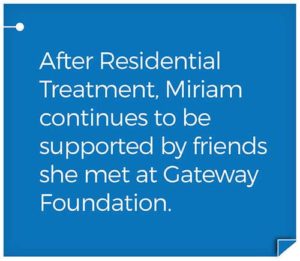- Jul 8
- Addiction Recovery AlumniRecoverySuccess Stories
Her whole life, Miriam had been afraid – of appearing weak, of admitting she had a problem, “of everything.” Her fear led her to the power of escape through art and reading. Then suddenly, the fear grabbed hold of her life, pushing her away from the characters of Anne Rice, Stephen King and John Irving, from her family, to alcohol and, for a period of time, the streets.
Married with children and pursuing a paralegal career, Miriam never kept any alcohol in the house because she just wasn’t “that kind of drinker.” In her spare time, she read, painted and volunteered. But Miriam started suffering from undiagnosed anxiety, depression, post-traumatic stress disorder (PTSD) and schizophrenia, which produced audio and visual hallucinations.
“I started drinking to quiet the voices,” she says, “to quiet my mind.”
It worked, at first. When she later sought professional help, she was prescribed antipsychotics. She maintained a period of sobriety until the symptoms worsened and she turned back to alcohol. Her self-medication progressed to making a drink “before (she) got out of (her) coat,” to drinking at work, to waking up in the morning and needing a drink to stop the alcohol withdrawal symptoms – “the shakes” and nausea. Sometimes she slept on the streets rather than return home.
“At least I knew I would have my alcohol and no one would take it away from me,” she remembers.
In the spiral of her alcohol abuse, her fear of asking for help won. One day, albeit still afraid, Miriam fought back. She searched online for alcohol treatment near her and she called Gateway. Gateway Chicago Independence team helped make arrangements for someone to pick her up and treat her in their dual diagnosis program for her co-occurring disorders.

“I didn’t want my husband to give up on me,” she says. “We’ve been together for 25 years and, through my addiction and my mental health issues, I put him through a lot. And he stuck by me. A lot of my family members walked away, because it’s easier to walk away. When I came into recovery, it was like waking up in an empty room – and the only person that was there was my husband.”
After Residential Treatment, Miriam continues to be supported by friends she met at Gateway. She graduated with her post-baccalaureate paralegal certificate. She continues to check out too many books from the library and volunteer with The Night Ministry, serving people who are in poverty and homeless. Life isn’t perfect: She is struggling to rebuild the family relationships frayed by her addiction every day. Her view on life, however, has forever shifted:
“I always have in the back of my mind, That could be me. It was me, and it could be me again. I take into volunteering at The Night Ministry this empathy because I know what it’s like to have people dismiss you because you’re just a drunk or dismiss you because you have mental illness. And I never feel dismissive of the patients that I deal with at Night Ministry because our stories, in a lot of ways, are all the same. The battle with addiction, the battle with mental illness. What it takes away from you, the way it strips your dignity away. To see a person at a low point like that, I always have this hope now. If things can be better for me, then things can be better for them.”
For help with drug or alcohol addiction, contact Gateway today.


